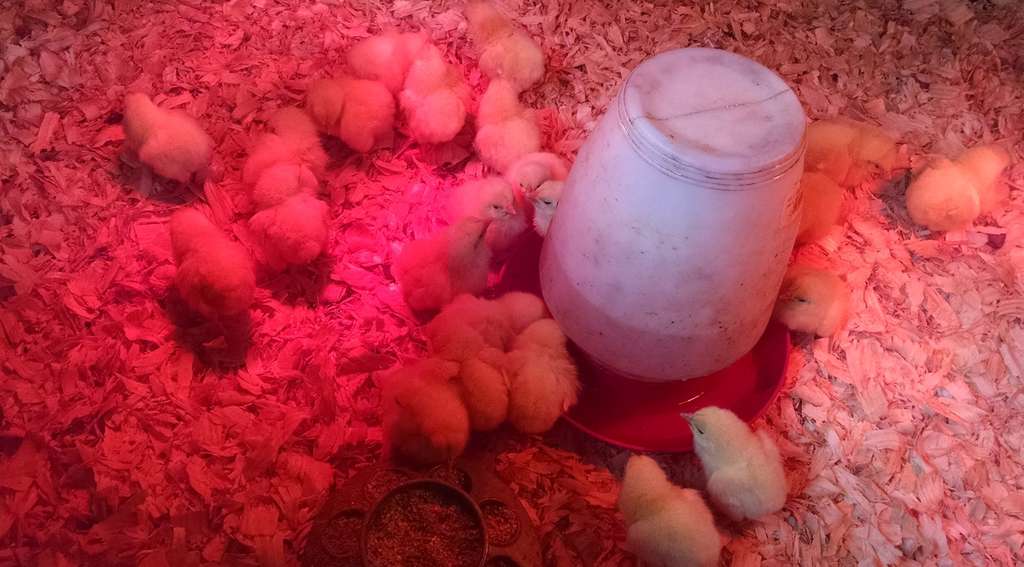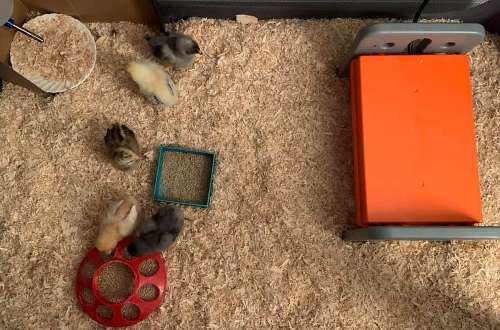Do chicks and baby chickens need a light at night?

Chicks and light:
Light affects the rate at which chicks grow, and too little has implications when raising a flock. Light should be bright enough to read by and there is no benefit to bright lighting when raising chicks, it may even promote cannibalism and toe pecking.
Baby chicks do not need light at night but they do need to be kept warm. It is usual for keepers to use a combined source of light and heat, hence they get both 24 hours a day.
Below: Baby chicks in a brooder with red light. Artificially reared chicks are usually given light for 24 hours a day.
Baby chicks kept with their mother do not need light at night, and get warmth from their mother. I have had hens hatch as early as March when the days are only 12 hours long so the chicks can cope with as much as 12 hours of darkness, This will mean they develop a little slower.
New chicks hatched without a hen do need warmth, and they also need a little light at night. If you are going to give your chicks darkness they need something to hide under like an electric hen or a mop head.
Plunging chicks or young chickens straight into darkness will cause blind panic, much bleating and scrabbling around and will cause them to smother each other by piling into corners.
For the most part backyard keepers prefer the easy solution and let chicks who are not with their mother get both warmth and enough nighttime lighting with a lamp.
Chicks need supplemental heat. Their little bodies will not keep themselves warm enough until they fully feather out. Feathering out means that they completely lose their baby down and grow true feathers.
Do chicks need darkness?
Chicks can survive up to 12 hours of darkness a night provides they are well fed and kept warm. Rearing chicks naturally with some darkness is the better option but might not be possible for all chicken keepers as some rely on a single source of light and heat.
This is an interesting point that has been much debated over the years and I have seen books and websites advocating both. I give natural daylight and red light bulbs for warmth and night lighting.
Chickens evolved in warmer places near the tropics where day length didn't change much more than a few hours over the whole year. In nature young chicks would have hatched out at around 12 daylight and matured at the peak of daylight hours, around 14 or so.
Below: Chicks kept under a heat pad or electric hen will get used to darkness much quicker.

The research shows that giving chicks 4 hours or so of darkness a night is the ideal but the difference between some and no darkness is in the order of 3 to 5% so the average keeper will see no measurable difference form all the effort.
Commercially chicks are given 24 hours of light. Although red light is often used at night and this is something the backyard chickens keeper can do very easily. I always use red light with my chicks so they get natural daylight during the day and red at night.
The problem comes when it is time for the youngsters to move outside, it can be a huge shock to all of a sudden have no light at night.
Getting chicks used to darkness:
Over a great many years I found the secret to getting youngster to adapt to darkness is to get them to perch properly to sleep. Roosting is a natural process as the light of day wanes into darkness
You can to some extent get young chickens used to darkness by:
- Putting them in with a old hen. I have several older hens I keep for this purpose, They will keep the youngsters in line and teach them to perch at the right time.
- Putting a red light bulb in the coop for a few days till the youngsters feel a little more comfortable and start perching properly.
- Getting in the coop with your chicks and physically putting them on the perches.
- Making sure the crop is full.
The instinct to perch to sleep is quite strong but it does sometimes need to be cultivated. Birds can and should be allowed to perch from 14 days old if they want to.
Patience is the key. And don't get them excited with treats or chasing them about the coop just before bedtime.
Will chicks sleep with the light on?
Chicks and chickens will sleep with the lights on. You will see that chicks for a ring around the light when they sleep in a brooder, mostly with their heads facing away from the light so its doesn't disturb them as much.
Even full grown chickens can sleep in a lit environment if they need to, they learn to ignore it after a while.
It is not ideal to keep them in an always lit area, darkness is important.
How long do baby chicks need light for?
Most breeds need light for about six to eight weeks depending on the outside weather. Brooding in the winter is different than brooding in the summer.
Baby chicks need supplemental light if you use a electric hen or ceramic bulb. It is usually easier to leave it on 24 hours a day but you can start getting the youngsters used to it being off from quite a young age.
What is the best light for chickens?
Red incandescent light bulbs are by far the best for chicks and older chickens. You need to use an old fashioned bulb with a filament in so it generates enough heat to keep the young birds warm.
When to start turning off the light at night:
If you have raised chicks before you will know there is a stage that most keepers dislike to some extent, it is when the time comes to turn the lights and warmth off at night and allow the birds to start behaving like adults.
Exactly when to start getting them ready for the big coop depends on your weather and conditions as well as the breed. Japanese bantams will need light and warmth for longer than Rhode Island Reds for example.
Do baby chicks sleep a lot?
Baby chicks do sleep a lot. Especially when they are very young. As they grow up they become much more active.
Expect your chicks to sleep for 30 to 90 minutes at a time and then have active periods that tend to last about the same.
